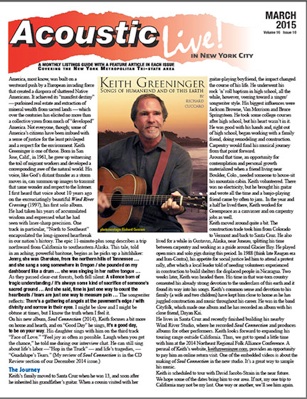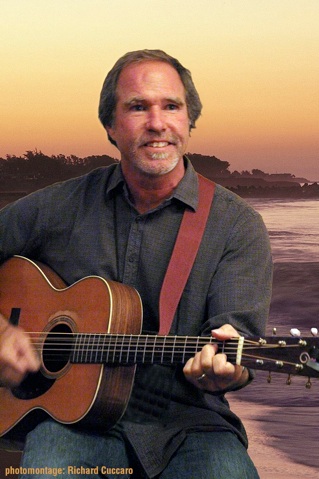Keith Greeninger
Songs of Humankind and of This Earth
By Richard Cuccaro
America, most know, was built on a westward push by a European invading force that created a diaspora of shattered Native Americans. It achieved its “manifest destiny” — purloined real estate and extraction of mineral wealth from sacred lands — which over the centuries has elicited no more than a collective yawn from much of “developed” America. Not everyone, though; some of America’s citizens have been imbued with a sense of justice for the least privileged and a respect for the environment. Keith Greeninger is one of those. Born in San Jose, Calif., in 1961, he grew up witnessing the toil of migrant workers and developed a corresponding awe of the natural world. His voice, like God’s distant thunder as a storm moves in, can summon up images to transmit that same wonder and respect to the listener.
I first heard that voice about 10 years ago on the excruciatingly beautiful Wind River Crossing (1997), his first solo album. He had taken his years of accumulated wisdom and expressed what he had seen with laser-sharp precision. One track in particular, “North to Southeast” encapsulated the long-ignored heartbreak in our nation’s history. The epic 11-minute-plus song describes a trip northward from California to southeastern Alaska. This tale, told in an aching, powerful baritone, begins as he picks up a hitchhiker: Jenny, she was Cherokee, from the northern hills of Tennessee … and she sang a song somewhere in Oregon / she pounded on my dashboard like a drum … she was singing in her native tongue … As they passed clear-cut forests, both fell silent: A silence born of tragic understanding / it’s always some kind of sacrifice of someone’s sacred ground … And she said, time is just one way to count the heartbeats / tears are just one way to measure pain … The songwriter reflects: There’s a gathering of angels at the pavement’s edge / with divinity and sorrow in their eyes.
I might be slow and I might be obtuse at times, but I know the truth when I feel it.
On his new album, Soul Connection (2014), Keith focuses a bit more on home and hearth, and on “Good Day” he sings, It’s a good day, to be on your way. His daughter sings with him on the third track “Face of Love.” “Feel joy as often as possible. Laugh when you get the chance,” he told me during our interview chat. He can still sing about life’s labor —”Hop in the Truck” — and life’s tragedies, — “Guadalupe’s Tears.” (My review of Soul Connection is in the CD Review section of our December 2014 issue.)
The Journey
Keith’s family moved to Santa Cruz when he was 13, and soon after he inherited his grandfather’s guitar. When a cousin visited with her guitar-playing boyfriend, the impact changed the course of his life. He underwent his rock ’n’ roll baptism in high school, all the while, however, veering toward a singer/songwriter style. His biggest influences were Jackson Browne, Van Morrison and Bruce Springsteen. He took some college courses after high school, but his heart wasn’t in it. He was good with his hands and, right out of high school, began working with a family friend, doing remodeling and construction. Carpentry would fund his musical journey from that point forward.
Around that time, an opportunity for contemplation and personal growth materialized when a friend living near Boulder, Colo., needed someone to house-sit his mountain cabin. Keith volunteered. There was no electricity, but he brought his guitar and wrote all the time and a banjo-playing friend came by often to jam.. In the year and a half he lived there, Keith worked for Greenpeace as a canvasser and on carpentry jobs as well.
Keith moved around quite a bit. The construction trade took him from Colorado to Vermont and back to Santa Cruz. He also lived for a while in Gustavus, Alaska, near Juneau, splitting his time between carpentry and working as a guide around Glacier Bay. He played open mics and solo gigs during this period. In 1988 (think late Reagan era and Iran-Contra), his appetite for social justice led him to attend a protest rally, after which a local leader told of needing volunteers experienced in construction to build shelters for displaced people in Nicaragua. Two weeks later, Keith was headed there. His time in that war-torn country cemented his already strong devotion to the underclass of this earth and it found its way into his songs. Keith’s common sense and devotion to his family (a wife and two children) have kept him close to home as he has juggled construction and music throughout his career. He was in the band Cityfolk, which made one album and he has recorded an album with his close friend, Dayan Kai.
He lives in Santa Cruz and recently finished building his nearby Wind River Studio, where he recorded Soul Connection and produces albums for other performers. Keith looks forward to expanding his touring range outside California. Thus, we got to spend a little time with him at the 2014 Northeast Regional Folk Alliance Conference. A perusal of Keith’s website, keithgreeninger.com, provides an opportunity to pay him an online return visit. One of the embedded videos is about the making of Soul Connection in the new studio. It’s a great way to sample his music.
Keith is scheduled to tour with David Jacobs-Strain in the near future. We hope some of the dates bring him to our area. If not, my one trip to California may not be my last. One way or another, we’ll see him again.


